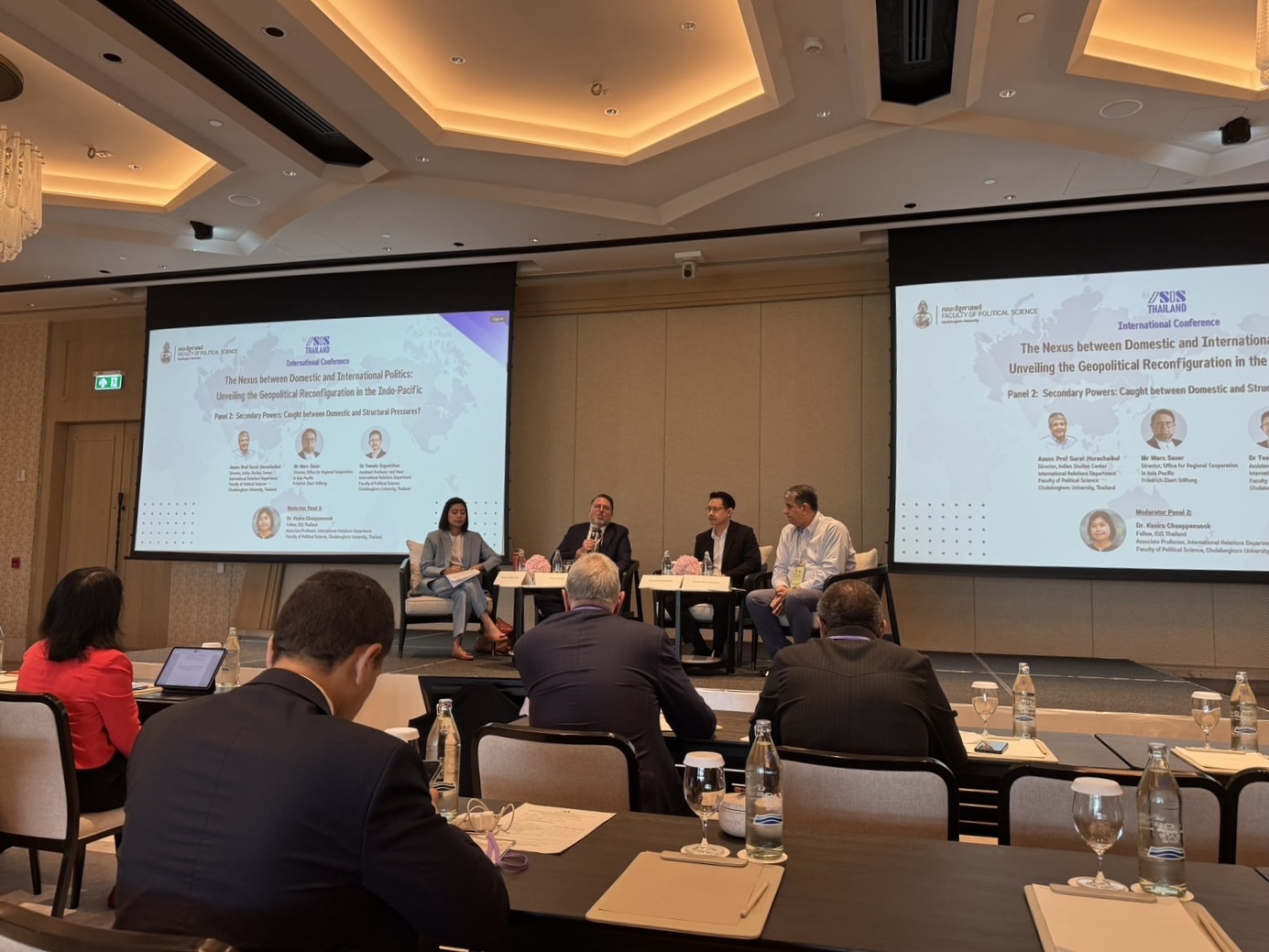On March 13th 2025, the HDFF team attended the conference “The Nexus between Domestic and International Politics : Unveiling the Geopolitical Reconfiguration in the Indo-Pacific”, organized by the Institute of Security and International Studies (ISIS) and held at Dusit Thani Bangkok. The following is a report on the second panel discussion.
Moderator : Dr. Kasira Cheeppensook, Faculty of Political Science, Chulalongkorn University
Speakers
- Assoc Prof. Surat Horachaikul, Faculty of Political Science, Chulalongkorn University
- Dr. Teewin Suputtikun, Faculty of Political Science, Chulalongkorn University
- Mr.Marc Saxer, Friedrich Ebert Stiftung
1) Germany: Shifting from a Welfare to a Warfare State?
Mr. Marc Saxer discussed Germany’s evolving security and defense policies in response to structural pressures. He highlighted the country’s disillusionment with NATO and the shifting coalition negotiations for the next government. Germany’s move to create a special budget for defense, which would bypass traditional deficit constraints was pointed out. He also addressed the domestic debate on balancing military expansion with the need to maintain social welfare commitments. Furthermore, Mr Saxer noted the rise of populist sentiments fueled by economic dissatisfaction and political discontent. He argued that Germany’s security policy is undergoing a challenging transformation, hindered by political fragmentation and the difficulty of implementing security policies trusted by the public.
2) India: Balancing Domestic Change and Global Aspirations
Dr. Surat Horachaikul identified four key areas influencing the relationship between domestic change on the one hand, and global aspirations on the other hand. First, he discussed India’s political landscape and governance, noting that under Prime Minister Modi’s leadership, the country has shifted from a cautious to a more proactive global stance, with nationalism and soft power playing key roles. Second, he highlighted India’s economic growth and trade, emphasizing how the country’s liberalization and integration into global markets, especially through the WTO and BRICS, have solidified its position on the international stage. After this, Dr. Horachaikul addressed India’s security and strategic alliances, focusing on the country’s defense modernization and its balancing act between non-alignment and multi-alignment. Finally, his intervention ended by underlining the challenges posed by domestic public opinion, referencing Barry Buzan’s concept of “autistic powers” to describe India’s selective engagement in global governance and its prioritisation of domestic policies.
3) Japan: The Trilateral Order and Regional Stability
Dr. Teewin Suputtikun highlighted the strengthening of the US-Japan-South Korea alliance as a deterrent against unilateral actions in the Indo-Pacific and the pause in historical tensions between Japan and South Korea, allowing for increased security cooperation. He also noted the domestic political challenges Japan faces, with a minority government and South Korea’s political instability, especially since President Yoon Suk Yeol’s attempt to declare martial law on December 3rd 2024, which is potentially affecting regional security strategies. Dr. Teewin emphasized that Japan’s security policies, while focused on regional stability, are constrained by domestic politics and shifting leadership priorities. In addition to all these factors, Dr. Teewin Suputtikun discussed Japan’s democratic and security dilemmas, highlighting how shifts in ruling parties and unstable foreign policies lead to domestic instability, while political actors remain divided on whether to engage with or balance against rivals for security.
Question from the audience : What are the domestic factors that are influencing the foreign policy of Japan, India, and Germany ?
● Dr. Suputtikun discussed Japan’s defense policy and its constitutional right to self-defense. He highlighted the importance of balancing security concerns, especially with the growing power of China in the region. Public opinion in Japan remains cautious about military expansion, with weapons seen as taboo. However, a lack of US support in the region could lead to a negative spiral, pushing Japan toward increased weapons production.
● Dr. Horachaikul explained that India’s foreign policy is heavily influenced by its shift away from socialism, with the Bharatiya Janata Party (BJP) promoting economic liberalization and trade. India aspires to become a global power, and this inspiration is reflected in its election manifestos, which emphasize public desires for stronger counter-terrorism cooperation, especially after the Mumbai attacks. Cultural elements, such as Hinduism and nationalism, also shape India’s foreign policy.
● Mr. Saxer focused on Germany’s vulnerability due to shifts in the ruling party and the impact of populist sentiments. He also highlighted the vulnerability of Europe and ASEAN, pointing out that the stress on the international architecture, influenced by the shifting power dynamics, as well as the structural restraints on the international order.
HDFF would like to thank ISIS Thailand for the invitation to this very comprehensive and informative event.


Comments are closed